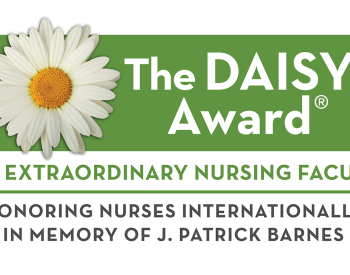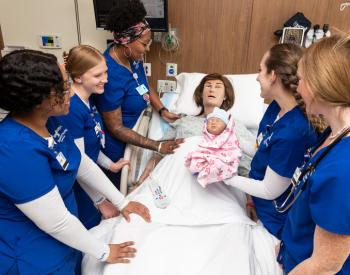
What is a DNP?

More and more, healthcare professions including nursing are focused on practice doctorates to develop the next generation of leaders and patient care experts. If you’re thinking about pursuing a doctorate-level degree in nursing, learn about the basics of a DNP degree, your program options, and what you can do career-wise as a DNP-prepared nurse. More and more, healthcare professions including nursing are focused on practice doctorates to develop the next generation of leaders and patient care experts. If you’re thinking about pursuing a doctorate-level degree in nursing, learn about the basics of a DNP degree, your program options, and what you can do career-wise as a DNP-prepared nurse.
What is a DNP?
A Doctor of Nursing Practice (DNP) degree prepares nurses to take on leadership roles in a range of hospital, clinic and academic settings, where they work to improve the quality and safety of patient outcomes.
According to the American Association of Colleges of Nursing (AACN), the DNP is intended for those “seeking a terminal degree in nursing practice and offers an alternative to research-focused doctoral programs.” But even though research isn’t the core focus, DNP-prepared nurses have the experience and knowledge to apply the latest science to real-world practice.
(Love research? Consider a Ph.D. in Nursing Science instead!)
Getting a DNP Degree
As you think about a Doctorate of Nursing Practice degree, there are some key considerations:
Academic requirements. Do you only need to have a Bachelors of Nursing Science? Or is a Master of Nursing Science required?
Online and offline learning. Programs that are 100% online are convenient for working professionals, but in-person clinicals and projects provide valuable hands-on skills.
Time commitment. Can you go part-time or full-time? If you’re aiming to earn your DNP in 2 years or less, look at a program’s timeline to completion.
Accreditation. The growing interest in DNP degrees means that new programs pop up quickly. Make sure your top choice is accredited so you don’t have to worry about quality.
Program cost. Will you be paying out of pocket or relying on your employer, grants or nursing scholarships for your tuition? Talk to financial aid counselors to determine what’s feasible for your budget.
DNP Programs in St. Louis & Online
Barnes-Jewish College Goldfarb School of Nursing is leading the way for those who want to advance their careers as DNP-prepared nurses. With the growing demand for doctorally prepared nurses—and with the understanding that working students need flexibility—we offer two different paths to achieving your DNP degree.
The two-year Post-MSN DNP program offers entirely online courses combined with clinical hours and an evidence-based project that are both customized to your interests, existing employment and location.
Our accredited DNP – Nurse Anesthesia program is open to both BSN and MSN-prepared nurses and includes 36 months of online and in person learning, along with clinical hours and an evidence-based DNP project focused on anesthesia care.
In either case, we will put you on track to pursue new career opportunities at the leading edge of nursing practice. Learn more about our DNP programs by contacting the Admissions Office.
DNP-Prepared Nurse Career Options
So what does someone with a DNP degree do? There are several career directions for DNP-prepared nurses depending on your interests and expertise.
Leadership
Those pursuing a management path will focus on quality and efficiency of care, as well as improving outcomes based on the latest research and best practices. These roles are typically based in hospital and clinic settings and rely on your leadership and organizational skills to make smart decisions about how things are run now and in the future.
Patient Care
As nursing becomes ever-more complex and fast-paced, employers are turning to DNP-prepared nurses to deliver care with confidence. In addition to serving as Nurse Practitioners, these types of direct patient care positions include Nurse Anesthetists, Nurse Midwives and Nurse Specialists working in medical centers, clinics and hospitals.
Academia
There are many paths to joining the nursing faculty at a college or university, such as becoming a Nurse Educator. Nurses with a DNP also make excellent additions to academic settings thanks to their knowledge of advanced practice that they can pass on to the next generation. With the worldwide nursing shortage, there is a growing demand for experienced nurses to teach.
Becoming a DNP-prepared nurse puts you at the forefront of the nursing profession, whether you want to guide practice in an administrative setting, by teaching, or continuing with hands-on care. What questions do you have about a DNP education or career? Or, if you’ve earned your DNP, what advice do you have for others considering this path? Please join us in the comments below.
Follow the Blog via Email
Enter your email address to follow this blog and receive notifications of new posts by email.
Follow the Blog via Email
Enter your email address to follow this blog and receive notifications of new posts by email.



